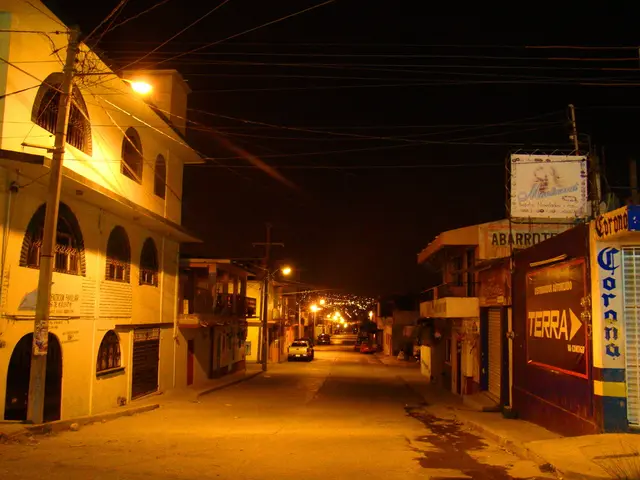Title: Will Other German Towns Follow Stendal's Lead in Rejecting the €49 Ticket?
Small-town Stendal makes history by partially rejecting the countrywide €49 public transportation ticket, leading to concerns about potential ripple effects across Germany.
The €49 Ticket's Partial Rejection in Stendal
The picturesque town of Stendal, home to 41,000 residents, announced its decision to opt out of the nationwide €49 ticket, which provides comprehensive coverage for local and regional transportation throughout Germany. Stendal, however, will not be spared from the ticket's benefits, as it remains valid for all transportation modes, including trains.
The city's move comes in response to concerns over the cost of participation, which is estimated to cost the town €40,000 in the initial four months of 2024. Despite federal and state financial support announced in 2023, the authorities have yet to finalize a plan for future funding.
Facing a Financial Cliff
Stendal's decision, while potentially influential to municipalities in similar financial straits, has been met with criticism. Critics argue that such rejections could lead to a patchwork of transportation policies across different regions, leading to confusion among passengers. Thuringia's Minister of Transport, Susanna Karawanskij, echoed these concerns, stating that the rollout of the €49 ticket should remain consistent nationwide.
Not all authorities share this viewpoint, and the option for towns like Stendal to opt out may become the new norm if other municipalities follow suit.
The Spin-off Effects
Should other German towns choose to reject or partially reject the €49 ticket, various implications could arise, including:
- Financial Consequences: The program's financial sustainability could be threatened if reduced participation leads to changes to the funding model.
- Public Perception: If the suite of participating municipalities shrinks, public support for the €49 ticket may wane, negatively impacting its effectiveness in promoting public transportation.
- Policy Adjustments: The German government might need to rework the program's structure if widespread rejections occur, offering incentives or revising the pricing model to encourage greater participation.
- Community Support: Subsidies for low-income residents, senior citizens, and apprentices in towns with successful implementation could serve as a blueprint for other communities, helping bolster participation levels.
- Employer Support: Companies that already subsidize the €49 ticket for their employees may continue to do so, offsetting some of the effects of partial rejections in other towns.
- Local Economic Impact: If key towns reject the €49 ticket, the resulting impact on traffic and local businesses could be significant, potentially ushering in a wave of economic setbacks.
Stendal and Its Precedent
By opting out of the €49 ticket in select scenarios, towns like Stendal may serve as a guidance for other municipalities in similar financial predicaments. As cities across Germany consider joining the €49 ticket program, the precedent set by Stendal will significantly impact the program's potential success.
In the weeks and months that follow, expect the German transportation landscape to evolve swiftly as municipalities grapple with their participation decisions, potentially leaving the country's €49 ticket program in flux.
Enrichment Data:
In examining the potential consequences of additional towns following Stendal's lead, several key considerations emerge:
- Financial Impact: Should widespread rejection or partial rejection of the Deutschland Ticket happen, the initial financing model – which includes contributions from the German federation and the federal states – may necessitate modifications. As a result, fewer participating municipalities could affect the program's overall financial viability.
- Public Perception: If multiple towns forsake the €49 ticket, public perception of the program could deteriorate negatively, dissuading potential users and undermining the initiative's ability to stimulate public transportation.
- Policy Adjustments: Should the federal government encounter widespread rejections, adjusting the program's implementation and financing structure may be necessary, such as revising the pricing model, enhancing service quality, or offering further incentives to participating municipalities.
- Community Support: Towns that successfully enact subsidies for particular segments, including low-income residents, senior citizens, and apprentices, could offer a roadmap for other towns, potentially inducing increased participation and approval of the initiative.
- Employer Support: If companies in towns that already subsidize the €49 ticket for their employees persist in doing so, a consistent user base will remain, tempering the effects of partial rejections in other municipalities.
- Local Economic Impact: If key municipalities reject the €49 ticket, the impact on traffic and local businesses could be substantial, potentially leading to increased traffic congestion and decreased local economic activity.
In sum, widespread or partial rejections of the Deutschland Ticket by German towns could pressurize the program's financial stability, public perception, and policy adjustments. Through towns that establish targeted subsidies and employer support, potential mitigation strategies could emerge, possibly counteracting some of these impacts.
[1]: "Deutschlandticket Stendal: Die Auswirkungen der Entscheidung." [2]: "Stendal", Statistisches Bundesamt. [3]: "Thüringen hat Rechtsvorschriften, um den Deutschlandticket in der Region Thüringen einzuführen." [4]: "Eine Meldung zur Frage, ob mit Stendal weitere Orte folgen werden."








